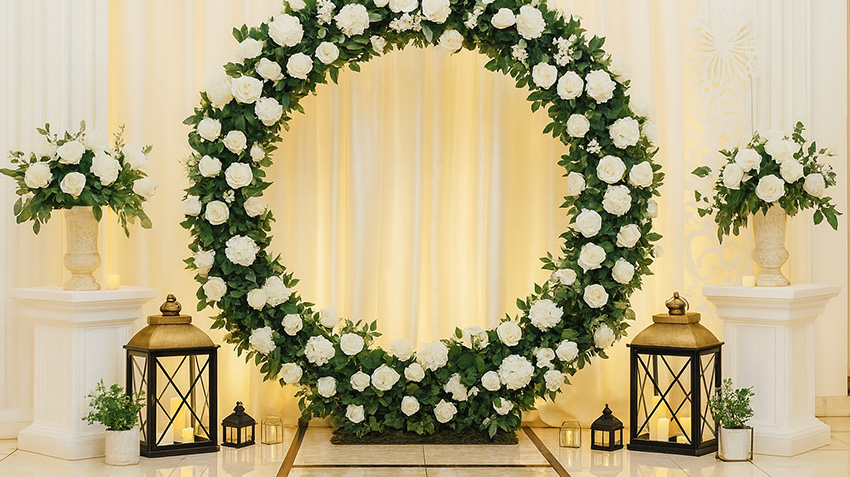
Losing an elderly loved one is never easy, even when their life has been long and full of cherished memories.
Families often search for ways to express their love, respect, and gratitude in a manner that feels both beautiful and dignified. Funeral flowers play a central role in this process. They are more than decorations; they are symbols of remembrance and heartfelt emotion. Choosing the right floral arrangement allows families to reflect personality, honor life achievements, and capture the sentiment of shared memories.
What is the significance of funeral flowers?
Funeral flowers have been used for centuries as a way of paying tribute to the departed and offering comfort to those in mourning. Their beauty conveys emotions that words often cannot. A carefully chosen arrangement can express love, admiration, and respect, providing solace to grieving families while creating a peaceful atmosphere.
Flowers also carry symbolic meanings that make them particularly suited for funeral services. Lilies are often seen as a sign of purity and the restored innocence of the soul. Roses speak of deep love and respect, with each color carrying its own nuance of meaning. Chrysanthemums, especially in many cultures, represent honor and longevity, making them a traditional choice for remembering elders. Choosing appropriate flowers ensures that the tribute reflects the values and spirit of the person being honored.
What are some examples of classic funeral flower arrangements?
Standing sprays are among the most elegant funeral flower designs and are often placed prominently near the casket or altar. Their height and arrangement make them visible to all, symbolizing a dignified tribute to the life lived.
Casket sprays are perhaps the most significant arrangement, as they rest directly on the casket itself. Families often choose colors and styles that reflect the loved one’s personality. For example, soft hues may suggest gentleness and kindness, while more vibrant shades can represent vitality and strength.
Wreaths are another timeless option. The circular shape is a powerful symbol of eternity and everlasting life. While traditional wreaths often feature white flowers, modern designs may incorporate bold colors or creative variations that reflect individuality.
Bouquets and posies, although smaller in scale, offer a more personal touch. These can be displayed at the service or kept afterwards as a reminder of the love shared. They are also practical for home memorials, allowing families to carry a piece of the tribute with them beyond the day of the service.
What are some personalized and meaningful designs?
Personalization has become increasingly important in funeral flower designs, especially when honoring an elderly loved one. Incorporating the deceased’s favorite flowers is one way to create a more meaningful arrangement. For example, if they loved sunflowers, including them in a tribute adds a layer of sentiment.
Flowers can also reflect hobbies, passions, or cultural traditions. A gardener might be honored with arrangements featuring blooms they once nurtured. Cultural or religious traditions can guide choices as well, ensuring that the flowers resonate with heritage and beliefs.
Color customization is another meaningful option. Soft pastels may suit someone remembered for their gentle nature, while bold and vibrant colors may represent a life lived with energy and enthusiasm. Some families also add photo frames, keepsakes, or ribbons with messages to arrangements, turning them into deeply personal tributes that go beyond traditional designs.
What flower choices are available, and what do they symbolize?
Lilies are among the most common flowers in funeral arrangements because they symbolize purity and the soul’s return to innocence.
Roses are versatile and carry deep emotional meaning. Red roses represent love and respect, white roses signify purity and reverence, and pink roses express gratitude and admiration.
Carnations are often featured in funeral flower arrangements due to their enduring fragrance and symbolic significance. Red carnations stand for admiration, while white carnations symbolize remembrance.
Orchids bring a sense of eternal love and delicate beauty. Their elegance makes them a fitting choice for sophisticated arrangements.
Chrysanthemums hold special meaning in many cultures, particularly when honoring elders. They symbolize honor, dignity, and longevity, making them a profound choice for celebrating a long life well lived.
Seasonal flowers may also be considered for their freshness and availability. Choosing flowers that are in season not only ensures vibrant arrangements but also connects the tribute to the natural cycle of life.
What are some helpful tips for selecting the right funeral florist?
Selecting the right florist is an important step in creating meaningful funeral flower designs. An experienced florist who understands funeral arrangements can guide families through the process with sensitivity and care.
Budget is another consideration. While elaborate arrangements can be beautiful, meaningful tributes do not always require a large financial investment. Florists can often recommend designs that balance cost with significance.
It is also important to check delivery options and timing. Flowers should arrive fresh and on schedule, aligning with the service or visitation times. Reading reviews or asking for recommendations can also help families find trusted local florists who have experience handling delicate moments like these.
How should I care for the funeral flowers after the service has ended?
The significance of funeral flowers does not have to end with the service. Many families choose to repurpose flowers by creating smaller keepsake arrangements or pressing petals into mementos. Others donate flowers to hospitals, nursing homes, or charitable organizations, extending their beauty to others in need of comfort.
Preserving flowers can also be a way of holding on to memories. Dried arrangements or framed petals serve as lasting reminders of the love and respect that surrounded the farewell. These gestures allow families to carry the symbolism of funeral flowers into the future, keeping the memory of their loved one alive.
Frequently Asked Questions
Below are some additional commonly asked questions to consider:
What is the difference between funeral flowers and sympathy flowers?
People often wonder whether “funeral flowers” and “sympathy flowers” are the same. Funeral flowers are arrangements meant for the funeral venue (church, cemetery, or funeral home) or directly for placement on or around the casket. Sympathy flowers are sent to the family’s home as a gesture of support and condolence, either before or after the service.
When is it acceptable to send flowers if I only find out about the death after the funeral?
Yes, it is acceptable. If you didn’t learn of the passing until after the funeral, you can send a sympathy arrangement to the family’s home. It’s still meaningful to express your condolences even later.
Are there any flowers or arrangements that I should avoid sending due to religion or culture?
Yes, in some religious or cultural traditions, certain flowers or displays are not appropriate. Also, some families prefer simplicity. Brightly colored or overly large or flamboyant arrangements may clash with the tone of the service; highly fragrant flowers may cause discomfort. It is best to check with the family or funeral home if you are unsure.
Honoring life with funeral flower designs
Funeral flower designs are much more than decorative tributes. They are powerful symbols of love, respect, and remembrance. For families saying goodbye to an elderly loved one, choosing flowers with intention can reflect a lifetime of achievements, values, and personal qualities. From traditional sprays and wreaths to personalized arrangements, flowers allow us to create a meaningful farewell that comforts grieving hearts and honors the memory of a cherished life.
Speak to a professional funeral services provider to learn more.



